Peter MALONE
Block Island Sound, The
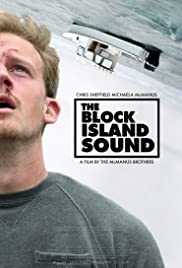
THE BLOCK ISLAND SOUND
US, 2020, 99 minutes, Colour.
Chris Sheffield, Michaela Mc Manus, Neville Archambault, Ryan O’ Flanagan, Matilda Lawler, Willie C.Carpenter.
Directed by Kevin Mc Manus, Matthew Mc Manus.
This is a horror film with an environmental background. It is a small budget, a family project with the directors and the leading actress.
It is set in Rhode Island, in a small to fishing town, but a lot of action at sea. The film opens up environmental problems, changing patterns of fish, difficulties in the fishing industry, unusual birds hovering…
And the human situation is difficult, the fisherman father disappears, the body washed ashore but still some ghostly appearances. This has quite an effect on his son and erratic behaviour. His daughter arrives, a scientist, investigating local marine life, bringing an associate to work with her. Another sister arrives from New York.
While there are environmental issues, there are also scientific issues of electricity, electromagnetic fields. The scientist also visits an expert to get some kind of explanation about what is happening, his offering scientific theories but also conspiracy theories about the fish and about nature.
The audience identifies with the scientist and her strange experiences at the end, experiences in the water, above the water, survival.
A horror film that is rather different, plenty of horror ingredients but more issues for environmental reflection.
- Title? Rhode Island? The visuals of the sound, the water, the Ocean, the island, the countryside, the roads, the town, homes? The musical score?
- The human drama – with the touches of the supernatural? The final touches of horror? A slow burning drama with a tense climax?
- The portrait of the family, living on the island for generations, boats and fishing? Audrey and her work, the investigation of marine life, Paul has her associate? Their work, samples, intentions? The phenomenon of the dead fish on the island, the dead birds? The visuals and the impact? Audrey, coming with Emily, the work with Paul, her relationship with Harry?
- Harry, his relationship with his father, the physical appearance of his father, intense, dominating, the traditions of the fishing, the boat? His disappearance? Harry and his causing trouble, the Coast Guard? His father’s body washed onshore?
- Harry, intense, the discussions with his friends, Dale and all his conspiracy theories, evidence, arguments? The meetings with Dale, following through on the conspiracies about the fish…?
- Harry, tense, short tempered? Audrey and her arrival? Emily? Bonding? Interactions with Paul? The effect of the death of his father?
- The mystery of the father, his continued reappearances, sinister ghostly?
- The funeral, the other sister arriving from New York, her life, interactions with Audrey, clashes with Harry? Her going back to New York?
- The mysterious elements of science, electricity, electromagnetic effects? The equipment, radio, television, phones…?
- The effect on Harry, erratic behaviour, going to see, his appearance and haggard, on the boat, Audrey returned, his tying up Emily, going out to sea, Audrey and the struggles, unable to contact the Coast Guard, the electricity, the explosion, Harry going into the air, Audrey? Paul coming, rescuing Emily?
- The underwater sequences, Audrey and her voice-over, speculating about marine life, the changes, the presence in the waters? And Emily emerging alive?
- Audrey and her investigations, the articles, the theories, the reclusive and his theories, are going to visit him, their discussions, his warnings?
- The mystery elements, alien powers, possible takeovers, intrusion electromagnetic attacks?
Dark Place
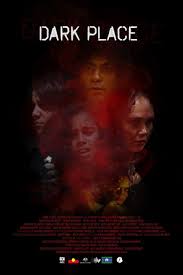
DARK PLACE
Australia, 2019, 75 minutes, Colour/black and white.
Nelson Baker, Katie Beckett, Shakira Clanton, Bernard Curry, Jolie Everett, Charlie Garber, Luka May Clunn-Cole, Sarah Pensalfini, Clarence Ryan, Tamala Shelton, Hugh Sheridan, Lily Sullivan, Josh Quong Tart, Natasha Wanganeen, Leonie Whyman, Tasia Zalar.
Dark Place is a 2019 Australian horror anthology film. The shorts in the film were directed by Indigenous filmmakers Kodie Bedford, Perun Bonser, Rob Braslin, Liam Phillips, and Bjorn Stewart, all of whom also wrote their own scripts.
All five shorts center upon the Aboriginal people of Australia and the long reaching impact of colonialism. With quote from Wikipedia.
"Scout" (d. Kodie Bedford)
A group of indigenous women have been kidnapped and forcibly sex-trafficked, however it seems like their captors may have darker plans for them. The women must try to not only escape, but also get their revenge against their white captors.
Scout is a middle-aged woman who has been abducted in her kitchen, imprisoned, interacting with the women in the trailer with her, one delicate, one very tough. They are dressed as prostitutes, supervised by the manager (Nicholas Hope), ill treated by two of the white men in charge of them. After a series of humiliations, Scout looks in the mirror, breaks it, takes a large shard and when brought before the manager, stabs him. She also stabs the two men, one of whom tries to excuse himself. The last sequences of Scout and the other woman, freeing others from the locked trailers and climbing a fence to freedom. Quite a powerful story.
"Foe" (d. Liam Phillips)
After a tragic event upsets her life, Eleanor begins to experience strange sleeping habits. She decides to record her sleeping patterns, but begins to notice something even stranger happening. The atmosphere is mysterious, the focus on Eleanor, psychological patterns.
"Vale Light" (d. Rob Braslin)
Forced to move after their last place caught on fire, Shae and her daughter Isabelle find themselves creeped out by their new neighbour Diane. While Diane initially seems friendly, it doesn't take long for her true, awful personality to emerge. She seems a sensible mother, concerned about her daughter. But in Diane, initially looking mature and seductive, is gradually revealed to be something of a crone, mysterious powers, abducting Isabelle. When she tries to rescue her daughter, Diane exercises powers, hypnotising Shae and urging her to cut out her daughter’s heart.
While Shae overcomes Diane, and everything seems to become normal, especially with new residents moving next door, Isabelle goes to the fence, transfixes the teenagers, luring them to her, Diane’s power in her.
"The Shore" (d. Perun Bonser)
Selena finds herself mesmerized by a figure in the water that may or may not be a vampire. A brief mysterious story, a focus on Selena, her husband dying, disfigurement to her teeth and mouth, struggles with the mysterious figure in the water. Filmed in black and white with sepia sequences.
"Killer Native" (d. Bjorn Stewart)
A British couple has traveled to Australia in hopes of finding a place to make their dream home. They do not expect it to be easy, but they did not expect to find themselves hunted. The couple, remembering London, the wife heavily pregnant, have all the presumptions of arrivals from the old world, land available to them, setting up a post, declaring that there is, hope for a prosperous future.
However, they encounter mysterious presences, but also an aboriginal man (very well spoken, more 21st-century like than 19th-century like), he warns them, they are pursued, strange creatures in the bush, refuge in a settlers’ hut, a mangled body in the cupboard, then the aboriginal man coming to save them, warn them, but the mysterious presence pursues, a female figure, the aboriginal man pursued, the pregnant woman and the child ripped out by the invading woman – and the settler then, bereft, shooting himself by the river. A dramatic look at the presumptions of the newcomers to the land, their ignorance of the indigenous people, and the consequences.
Anthony
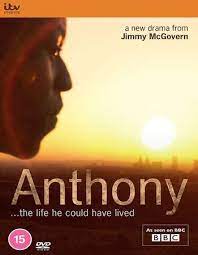
ANTHONY
UK, 2020, 86 minutes, Colour.
Tohib Jimoh, Bobby Schofield, Stephanie Hyam, Julia Brown, Rakie Ayloa.
Directed by Terry McDonough.
An immediate recommendation for this moving film made for television is the fact that it was written by Jimmy McGovern. For several decades, Jimmy McGovern has written outstanding work for the cinema (Priest, Liam) and for television (Cracker, Broken).
As with most of his material, the film is set in Liverpool, the atmosphere of Merseyside. The initial setting is 2005 with the information about the death of Anthony Walker. However, it moves to an awards dinner, hosted by Richard Osman (and, later, playfully, there will be a scene during the making of television’s Pointless where Anthony will propose to his fiancee on set). An award is made in his name, to his friend Michael, a man with a stammer who then announces the award should go to Anthony himself.
At this stage, the structure of the film goes in reverse time, from Anthony at 25, back each year to his age 18. The premise of the film is that it dramatises what Anthony’s life might have been like had he not been killed. Episodes in the reverse tale show his social work, his discovery of his friend Michael begging in the streets, challenging him, bringing him home, discussions with his wife. There is a scene of the birth of the child which takes place during a train journey. There is a wedding sequence, Michael invited to be best man despite his stammer, his agreeing, but his drinking and failing. There is the ritual of the wedding, comparatively long for the film, the vows and promises, the rings, as well as the dance celebration afterwards.
There is the scene of the proposal during Pointless, scenes of Anthony with his devoted mother, a strong religious woman. We see Anthony volunteering for work with youth, pleading for a player not to go on detention, Catherine being his teacher, hard at first, then relenting, and dating Anthony.
Anthony also goes for an interview to get a position in a law firm, succeeding. However, he is the victim of racist attitudes, defended by Michael who becomes a friend, but, ultimately, out with friends they are insulted in the street, run, a bus not stopping, going into a park, an assault, Anthony hit with an ice pick, to hospital, his mother attending his bedside after praying powerfully with the nurse, his death.
There is a recapitulation of his life that might have been, a highlighting the results and absences because he did not live.
- The title, the focus on Anthony, the information about his death?
- The structure of the film, the focus on the award, Anthony at 25, the screenplay going back year by year to the age of 18? His final year? His death? The film telling the story of what he might have been (and the recapitulation at the end?
- Jimmy McGovern’s career, film writing, television writing, Merseyside and Liverpool, social issues? Personal issues? Religious atmosphere?
- Anthony, at age 25, the dinner, Richard Osman sharing (and the reference to Anthony proposing to Catherine during an episode of Pointless)? The award, Michael coming, present with his wife, stammer, not making speeches, in making the award to Anthony himself? The applause?
- Going back over Anthony’s possible life, the encounter with Michael in the street, begging, confronting him, the threat of the police, Catherine agreeing that Anthony bring him home, the visit to his wife, seeing the children, the story of his drinking, and his begging? Anthony persuading him to come home, the meal, the offer of care?
- The train ride, Catherine pregnant, waters breaking, the search for a doctor or nurse, the nurse volunteering, the impact of the birth, the daughter, everybody celebrating? Anthony’s mother coming, her devotion?
- The wedding, the preparations, Michael asked to be best man, agreeing, hesitation, drinking, failing, the phone call? The ceremony itself, the congregation, the outdoor setting, the Minister, the vows and promises, the children with the rings? The celebration, entry, speeches, the dancing? Anthony’s encounter with his absent father?
- Anthony, volunteering as a coach, the sports, his love for basketball, the boy in detention, his approaching Catherine, the phone calls negative, on the field, her giving in, the outing, conversation, at home, the tentative kiss?
- Anthony’s mother, constant presence, her husband leaving her, the children at home, her prayer of thank you, going into the church? And her prayer with the nurse for Anthony?
- Anthony, the three men taunting, the criticisms, Michael coming to his defence? The issues of racism?
- Anthony, legal ambitions, to go to the US, civil rights, the interview, talking about defence, calm, fighting? His fearing that he would be rejected? As mother’s affirmation? The phone call and acceptance?
- Anthony, criticising his sister for her dress? His going out, friends, across the street, the taunt from the racist man, the running, the bus not stopping, in the park, the group attacking, the ice pick, Anthony wounded, the couple helping him, the ambulance, phoning his mother? Her going to the hospital, the explanations, praying with the nurse, her recapitulation event in his life and values? Sitting with him, his death, coming home and telling the children?
- The recapitulation of what might have been, the job, the law, meeting Catherine, marrying her, their child, helping Michael – but all that failing, including Michael dead?
- The invitation to audience understanding of Anthony, his family and life? Hopes? Race issues in the UK? And empathy for the characters?
No Man's Land/ 2020
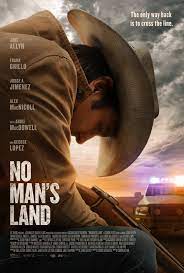
NO MAN’S LAND
US, 2020, 114 minutes, Colour.
Jake Allyn, Frank Grillo, Jorge A. .Jimenez, Andy McDowell, George Lopez, Alex MacNicoll, Andres Delgado.
Directed by Conor Allyn.
There are heavy overtones in the phrase no man’s land, the land in between hostilities, possible peace, and people homeless. In this film, it is the territory between Texas and Mexico, the area of American ranchers as well as refugees crossing the border.
While the film has many aspects of a contemporary western, especially the family on the ranch, the son is working for their father, prospects, there is also the presentation of modern Mexico, the vast extent of Mexico, ranchers, towns, and a portrait of ordinary Mexicans the film also serves as a moral fable.
In the confrontation between the ranchers and the refugees, a young boy is killed. One of the sons of the ranchers, who has college prospects in baseball, but who also likes to work on the ranch, is responsible for the death of the boy. His brother is shot and taken to hospital for surgery.
The son, played by Jake Allyn who co-wrote the screenplay, with the film directed by his brother, Conor Allen, experiences guilt, remorse, travels into Mexico, tangles with some gun shooters who have been exploiting the refugees, fleecing money at the border, threatening violence. However, he is also taken in by a sympathetic family and works with their horses. He decides that he will travel to the town where the boy is to buried, travelling on a bus and befriending an English teacher reading Huckleberry Finn to her son, opening his eyes to the lives of ordinary Mexicans who are not refugees. There are further incidents before he reaches the town, taken by the Texas Ranger commissioned by his parents to find him.
There is a funeral procession, a Mass, the son going to the church, going to apologise to the father who forgives him. In the meantime, the violent man turns up, a shootout, but the reconciliation holding and the son returning home to his family. The film extends its moral fable aspects with his decision to return to Mexico, to share life with the Mexicans, the Mexicans whom he had not understood, living and working with them, some kind of atonement.
- The title? The Texas area between US and Mexico? And the film dedicated to all those who find themselves in any no man’s land.
- The Texas settings, the landscapes, the ranches, the cattle runs, the border rivers, the Mexican settings, the no man’s land, the vast extent of Mexico, the ranches, the roads, the towns? The musical score?
- The stance of the filmmakers concerning Mexicans, migrants and refugees, American stances, prejudices, violence, confrontations with the refugees, deaths? The lives of ordinary Mexicans, good and bad, with the emphasis on the good, Jackson’s experience, the family taking him in, the old couple helping him on the run? And the family who experience the death?
- The father, his leading the refugees, his reputation, the boy, his death, the father angry, vengeance, teaming up with Luis?
- Jackson and his family, his father running the ranch, the support of his wife, the two sons, Jackson and his baseball talent, college, the possibility of a future, yet his wanting to work on the ranch? His bond with his brother?
- The picture of the refugees, the leader, Jackson’s encounter with the boy, then with the group? The family interpreting the group as hostile? Yet their not being violent, but the boy with the gun? The interchange, the shots, the boy being killed, Jackson with the gun, Lucas and his being shot? The repercussions for the family? Lucas in hospital, the parents and their concern?
- The focus of the film then on Jackson, his background, attitudes, critical of Mexico and Mexicans, supportive of his family, American stances? The impact of the shooting of the boy? His sense of responsibility? Going into Mexico, riding, in the town, the encounter with Luis, the hostility and violence, his getting away? The couple in the van, his talking with them, their helping, welcoming him into the house, the family, the daughter speaking English, the horse, his training it, their gratitude, his being part of the family?
- Jackson, conscience, wanting to make amends, confiding in the daughter, her buying him the ticket, on the bus, his surprise of the vastness of Mexico, travelling south, thinking all Mexicans wanting to be refugees to the US, the mother, English teacher, reading the boy Huckleberry Finn, his reactions, Jackson reading to him?
- Luis and the father of the boy in pursuit, holding up the bus, the confrontation, their holding the mother and son and getting the information of his destination? His escape, the pursuit, the shots? The father and his reaction to Luis, severing the relationship, Luis saying he was wanting to help? The father driving home for the funeral?
- Jackson wandering, the old man, the welcome, his wife and the food, his carvings?
- The family, anxiety, the phone calls, Lucas and the surgery?
- Ramirez, the Texas Ranger, the attitude of the family, the demands on him, his going into Mexico, the mother’s assertion, his travels, the bar, the information, tracking down Jackson, taking him, their going into the town?
- The father, going home, his mother and support, the coffin with the son? The procession through the town, going to the church, the mass, the priest and talk of forgiveness? Jackson seeing the procession, going into it, going to the church, the encounter with the father, the father with a knife, cutting the bonds, Jackson sorry, the embrace? Luis, the gun, Ramirez and the shooting? Jackson saved?
- Jackson going home, the encounter with Lucas, with his parents, his decision to go back to Mexico – his sense of atonement?
- The atmosphere of a contemporary Western, the Mexican sequences, the reality of migrants, violence and hostility? The film as a moral fable about repentance and atonement?
White Tiger, The
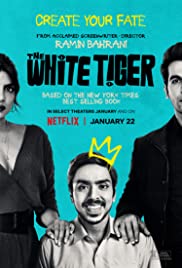
THE WHITE TIGER
US/ India, 2021, 125 minutes, Colour.
Adarsh Gourav, Rajkummar Rao, Priyanka Chopra.
Directed by Ramin Bahrani.
In a way, The White Tiger has to be seen to be believed. It is an adaptation of a very popular novel of the same name by Aravind Adiga, 2008 (and nominated for a Best Adapted Screenplay Oscar, 2020).
There is no lack of plot in this extraordinary tale of a poor Indian boy, the vicissitudes of his life, his shrewdness in making the most out of his life, not bound by moral scruple.
After being thwarted in his education, he has a job in the mansion of the local wealthy family, eventually becoming one of the chauffeurs, especially to one of the sons and his wife who have returned to India from the United States. He ingratiates himself with the family, and begins a series of extraordinary wheeler-dealings to improve his status.
Part of his experience is having to take the blame for the death of a child in a car accident when the lady of the house was actually driving, drunk. However, he takes advantage of the situations, no scruple as regards financial fraud, even, eventually to a murder.
In its 125 minutes, there is more than sufficient plot for a miniseries. The screenplay was written by Iranian-American director, Ramin Bahrani, whose wide range of films include Goodbye, Solo, 99 Homes, the remake of Fahrenheit 451.
- The White Tiger, the symbol, the Tiger in the zoo, Belram a white Tiger?
- Oscar-nomination for best adapted screenplay from the novel?
- India, the settings, the countryside, the small village, details of home, school? The contrast with the city, vast, poor neighbourhoods and slums, narrow streets? The contrast with the wealthy, homes, interiors, hotels, political venues? The finale in Bangalore, the Silicon Valley of India, buildings, companies, the driving company? The musical score? Indian tone?
- Belram as an adult, the reckless driving and merriment, the accident, his success, appearance, wealth, his narrating his stories, the flashbacks to his childhood, early work as a driver? The buildup to the car crash and accident again? The consequences?
- The little boy, at school, ignorance, his capacity for reading, the praise of the teacher, the white tiger? At home, his abilities, encouragement? The family, his father and his work, the support of his grandmother? Growing up, friends, talent?
- The adult Belram, to the city, being hired, becoming the driver? Age, experience, the touch of naivete, his seeing himself as a servant, the ethos of the servant, deference?
- The family, coming to the countryside, the heavy demands on taxes, collecting the money, Belram’s father and his having no money? Belram being employed? The father and his arrogance, his brother, their treatment of Belram? His having to drive for Ashok and his wife?
- Ashok and his wife, living in the United States, the return home, the style of living, treatment of servants? The birthday, the celebrations, Pink wanting to drive? Belram in the back, the recklessness, the speed, the child in the street, run over? The dilemma? The decision to leave? The effect on Belram?
- The aftermath, Belram being summoned, the family present, the lawyer, the draft of the confession, the pressure on Belram, his signing the confession, the family’s hold over him?
- The consequences for Ashok, the clashes with Pink, her walking out, getting Belram to drive her to the airport? Ashok and his upset, anger, drinking? Treatment of Belram? Belram continuing to drive him to functions, the political implications, the bribes, the bags?
- Belram talking about his change of attitude, the money in the bags, his handling it? Getting advice from other drivers of how to make money from the owners, shortchanging, selling the petrol, acting as a taxi and charging fees?
- The treatment by the family, the humiliations? Is trying to serve Ashok?
- His plan, the broken bottle, pretending the breakdown, to fix the wheel, the rain, Ashok in the rain, the attack, Belram killing him? Abandoning the body?
- The young cousin coming from the country, Belram attacking him, then supporting him, getting the job, taking him with him in the escape, the various train rides, arriving at Bangalore, the Silicon Valley of India?
- Belram learning from the family, taking the money, going to the authorities, making the bribe, getting the support? His setting up his business? The drivers? His more decent way of treating them? His prosperity? The visit to the zoo with his cousin? The white tiger?
- The setting in the 2000s, India and the political background, the visit from China, Belram and his approach to the dignitary and offering the taxi service?
- The narrative as a comment on India, the people, wealth and poverty, politics, corruption, individuals making their way?
Boundaries

BOUNDARIES
US, 2018, 104 minutes, Colour.
Vera Farmiga, Christopher Plummer, Lewis Mac Dougall, Christopher Lloyd, Yahya Abdul- Mateen II, Kristin Schaal, Bobby Cannavale, Peter Fonda, Dolly Wells.
Directed by Shana Feste.
Boundaries is a different kind of road film, some serious underlying themes, but much of it played for comedy. It has a very strong cast in the lead roles as well as support, like Christopher Lloyd and Peter Fonda.
The initial focus is on a mother and 14-year-old son, Vera Farmiga and Lewis McDougall, who have to leave a nursing home in the north-west and travel south to California for the mother to meet up with her rather carefree, more than carefree, father, a drug dealer. He is played with tongue in cheek comic touch by Christopher Plummer.
The film is an emotional journey for the mother, having to come to terms with her strange in a strange father, her son wanting to meet his actual father, Bobby Cannavale.
Some picaresque adventures, a collection of some odd characters, and some focus on contemporary family issues.
- The title? In relationship to family? Going out of bounds?
- The American settings, the North Western states and scenery, homes, workplaces, institutions, the drive south, Oregon, California, Sausalito, San Francisco, Los Angeles? The musical score?
- Laura’s story? Seen in therapy, nerves, interactions with the therapist, concealment? The background of her collecting dogs and caring for them? At home, with Henry, his problems, the obscene drawings, his being expelled? The interview with the principal and the sketch? Not answering her father’s phone calls? Finally answering, going to see him, his place in the home, his impositions on her, the story of his terminal cancer, her believing him though wary? His plan and the travel? Contact with her sister? The plans for the trip, the discussions with Sophia, the birthday party plans, the white Tiger?
- Henry, his age, relationship with his mother, his aunt, the obscene drawings? Expelled? His absent father? Meeting his grandfather? The preparation for the trip?
- Jack, the past, absence from his daughters, his treatment, Laura and her resentment, her telling her story, going over it with her father, challenge to him, condemning him? Her getting out, marrying young, having Henry, her husband leaving her, his alleged chronic fatigue, the divorce?
- The road trip, Los Angeles the destination, Jack to live with his daughter?
- The revelation of the drug dealing, Jack confiding in Henry, asking him to help? The sale to the Buddhist monks?
- The examdple of grooming by an adult, manipulating the younger, leading to corruption? Even with Henry complying, saying that he liked the drug dealing?
- The visit on the way, Stanley as an old friend, the art, the hospitality, Jed and his disability? The drug deals?
- The detoured to Leonard, the drug dealing, his background, seductive, the night with the Laura, her reaction? Henry questioning his father, finding Leonard not interested in him?
- Meeting his friend, Peter Fonda, the reminiscences, the attempted hold up by his nephew?
- On the road, Laura and the truth about the drugs, throwing them out, the police car, collecting the drugs, her being caught and the heavy fines and payment? Jack paying?
- The arrival in Los Angeles, JoJo and her welcome, her personality, her apartment, reaction to her father?
- Laura and Henry, the dogs, the return flight? Serg looking after the dogs in her absence, meeting her, the promise of the date?
- Jack turning up again, wanting to stay with his family?
- An ordinary family, ups and downs? The background of the drug dealing and moral issues? Family, boundaries, reconciliation?
Million LIttle Pieces, A
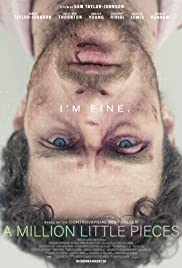
A MILLION LITTLE PIECES
US, 2019, 113 minutes, Colour.
Aaron Taylor-Johnson, Billy Bob Thornton, Odessa Young, Giovanni Ribisi, Juliette Lewis, Dash Mihok, Charles Parnell, Ryan Hurst, Charlie Hunnam, David Dastmalchian.
By Sam Taylor-Johnson.
One Million Little Pieces is based on a book by James Frey, the central character of this film having his name. There was some question as to how autobiographical this story was or that was created by its author. The book was adapted for the screen by the husband-wife team, central actor Aaron Taylor Johnson and director, Sam Taylor-Johnson.
The setting is the 1990s, the focus on James, a drug and alcohol addict, having an accident, put on a plane, sent to a rehabilitation centre for treatment. The film shows the treatment but also focuses on a number of those present in the institution, especially an older rough-mouth veteran, Billy Bob Thornton, with Giovanni Ribisi, Charlie Hunnam, and an older African-American clarinet player, a former judge, Charles Parnell.
The audience is invited into the institution, to experience daily life, the interactions, the treatments, possible solutions, possible rehabilitation.
- Title? Drug addiction? Rehabilitation?
- The author, journalist, his book, alleged truth, expose, apologies? His further work in writing? Screenwriting at production? Collaboration to the screenplay with the actor and Dir?
- An American story? Universal story? The rehabilitation centre, interiors, rooms, offices, meeting spaces? The grounds? Excursions into the city, the dentist? The search for Lilly? Authentic feel? Musical score?
- The opening? James as frantic, visual style, music, naked, the window, his fall? Waking in the plane, bewildered, ask for a drink, refused? Landing, by Bob? The relationship? Being taken to the rehabilitation centre? His attitudes, the impact of the past?
- The later revelation of James’s story? And his writing the text for confessing? As a boy, growing up, drugs, selling, dependence, liking the drugs, the wide choice, crack cocaine, alcohol? His collapse? The revelation of relationships, the girl and hurting her? In the church, the priest, touching him, his reaction, kicking him? The cumulative effect of his past?
- James, entering, hostility, his room, Miles and the music? The roster and the toilet jobs? Roy and his supervision, dominance, James eventual violent reaction? Roy and his collapse? James keeping to himself? Discussions with Joanne? With Lincoln and his supervision? Leonard and his friends, their wanting to welcome him? The meetings, James walking out, his hostility to the 12 steps?
- The treatment, the medication, the consequences, in his room, sleep, nightmares?
- The encounters with John, sexuality, naked, the shower, his advances? John’s own story, his daughter? Preparing to move out? Reconciliation with James, James’s support?
- The other members for rehabilitation, miles and his music, as a judge, his second attempt at becoming clean? Wise advice? The boxing champion, friendly, watching the television?
- Join in, the revelation that all the staff had been addicts, her story, listening, treatment of James, Frank? Lincoln, addict, his supervision, tough? Conversation with James and explanations?
- James, the driver to the appointments, the dental work, unable to have anaesthetic, the pain, the consequences?
- Leonard, his story, cheerful, articulate, wise? Yet feeling suicidal everyday? Reaching out to help James? The conversations, the confession? The advice for James to burn the papers? Leonard offering to be his father? A future?
- Bob, older brother, his visits, James reactions? Bob eventually arriving to take him out?
- Lilly, addiction, prostitution? Age? Flirting with James? Making contact? The danger with the rules and any female contact? The meetings, the shed? Are talking? The sign of the number of plates in the dining room? The misunderstanding, out in the rain, the visit to the room? Her escape, James and his desperation, going to find her, Leonard and his help? The rescue? Her talk with James – and her hanging herself? James and his sense of responsibility?
- The meetings, James gradually understanding, yet hostile, the staff explaining the had that he had worked through some of the steps, especially with helping Billy? Coming out of himself? The visit to the priest, the founder of the Centre, the welcome from the priest, the conversation rather confession, James having written his text, Frank, walking out?
- Leaving with Bob, going to the bar, asking for the biggest whiskey, the payment, his image in the mirror, smelling the drink, holding the glass, eventually turning away, the camera through the glass looking at his going away with Bob?
- The fact that the plot, while based on some truth, was, in fact are fiction by the author? Yet a harrowing interpretation of addiction and rehabilitation?
Black Narcissus/ 2020
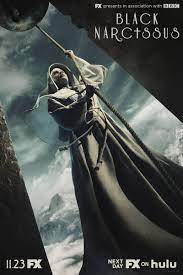
BLACK NARCISSUS
UK, 2020, 175 minutes (3x55), Colour.
Gemma Arterton, Aisling Franciosa, Alessandro Nivola, Rosie Cavalliero, Patsy Ferran, Soumil Malla, Jim Broadbent, Diana Rigg.
Directed by Charlotte Bruus Christensen.
Black Narcissus is based on a novel by popular writer, Rumer Godden. It was made into a successful, even classic, filmed by Michael Powell and Emeric Pressburger in 1947, while India settings were all filmed in British studios. And it starred Deborah Kerr in the central role of the superior of the Anglican convent in the Himalayas, with Kathleen Byron as the nun eventually going mad, with David Farrar, Jean Simmons and Sabu.
This production offers more time to explore the characters and themes, a television miniseries with three hour-long episodes.
The film takes advantage of location photography to set the atmosphere of India and the Himalayas, the villages, the remote convent. This time Gemma Arteton as the central role and makes it her own. There is a very strong supporting cast portraying the sisters in the convent, the various personalities, their experience of life in India, their backgrounds in England, spirituality, worldliness, the crushing of personality and emotions.
There is also a strong supporting cast including Aisling Franciosa (The Nightingale), with Jim Broadbent as the priest, Alessandro Nivola as the local inspector and object of desire by the mentally disturbed nun, and one of her final performances by Diana Rigg.
There is a place for the 1947 version as well as this 21st-century version.
- 21st-century British mini-series for television? The remake of the 1947 classic? Comparisons?
- The original at 100 minutes, this remake having almost 80 minutes extra to develop the characters and situations? More information about the characters, more details of their interactions, the personal and moral crises?
- The 1930s setting, Britain and its colonial presence in India, colonial attitudes? Anglican missionaries and their role? Education? Religion? The local governors and generals? Sympathy towards the British and not? Education opportunities? The British administrators on behalf of local government?
- The Anglican background, High Church? Similarities with Catholicism? The religious congregation, habits, names, commitment, capital and statues, mission, community life, the role of the superior, obedience? In the context of India, being away from England, in the heights of the Himalayas? Spirituality, prayer, scripture readings? Community meetings? The role of the superior in Darjeeling, communication with her, decisions about moving Sisters and others coming in? The role of the priest, chaplain, supervisor?
- The scenes in Darjeeling, introduction to Sister Clodagh, the discussions with the superior, decisions about the school, the selection of the Sisters, the work, the intended visit of father Roberts?
- The flashbacks, the young woman, pregnant, giving birth, enclosed in the room, her falling to her death? The housekeeper and her devotion? The locked room? Unchanged? Forbidden?
- Stories about the failure of the German brothers, closing the school? Apprehensions about setting it up? The local general? The agent?
- The journey, the difficulties, the group of Sisters, the arrival, the welcome? The housekeeper and her welcome? The later introduction of the young girl, lower caste? The space for school, classes? The little girls coming? The prince, age, experience, his requesting education? Gradually setting up the school, the routines?
- Mr Dean, the war background, in India rather than England, his attitudes, drinking, with women, atheism? His work, helping the sisters, the building, transport? The interactions with Sister Clodagh? The setting up of the sexual tension? His attitudes, his reticence? The attacks by Sister Clodagh? Imposition by Sister Ruth? The other Sisters collaborating with him in the work and admiring him?
- The general, welcoming the Sisters, his control, the Prince? The behaviour of the Prince with the young girl, the issue of lower caste, the public caning?
- Sister Clodagh, her character, flashbacks to the past, the romance, the war, the young man going, not wanting her on return, her family? Entering the convent? The mission? Strong-willed, the challenge to her pride? Are being commissioned to start the school, her relationship with the other sisters? The management of the community? The meetings, rebukes? Sister Philippa and the garden, closure reprimanding her about obedience? Sister Philippa and her leaving? Clodagh’s regrets? The crisis with Sister Blanche and the baby, the medicine, the baby’s death? The danger of an uprising? Mr Dean resolving the issue? With Sister Brioney, practical, helping, with solutions, commonsense?
- Sister Ruth, her background, mental instability, in the community, jealousy of Sister Clodagh? The attraction to Mr Dean? The erratic behaviour, Fr. Roberts and his visit, on Sister Ruth’s side? Ruth going into the locked room, the dress of the dead woman? The gradual buildup of tension, Sister Clodagh and her apprehensions, the discussions with Mr Dean, on the belltower? Ruth, the dress, going to Mr Dean, his rejection of her? Her going to the belltower, the struggle with Sister Clodagh, falling to her death?
- Sister Adela, sent as a replacement, puritanical attitudes, critical of Sister Clodagh, the experiences, Mr Dean, Judgmental?
- Sister Clodagh, the handling of the crises, jolts to her pride, sleepless nights, wandering, the discussions with Mr Dean, clashes, apologies?
- The attention given to the Indian characters, the housekeeper and her beliefs, support, the young girl, the encounters with the prince, the sexual encounter, her being caned? Sister Clodagh’s stand? Joseph Anthony, young, at the school, diligent in his work? The general, his standing, the Prince?
- The holy man, sitting in contemplation, Sister Adela and her objections, Sister Clodagh going to him? The revelation that he was the general’s brother?
- The failure of the mission, the school, the Sisters withdrawing?
- Portrait of a religious community? Of the individual Sisters? Of these difficulties and struggle in the mission? In the context of colonial India?
Thunder Force
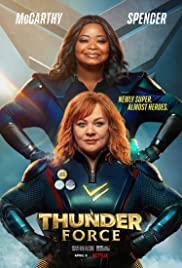
THUNDER FORCE
US, 2021, 105 minutes, Colour.
Melissa McCarthy, Octavia Spencer, Jason Bateman, Bobby Cannavale, Pom Klementief, Melissa Leo, Taylor Mosby.
Directed by Ben Falcone.
Here is a spoof of superhero films. It is a star vehicle for Melissa McCarthy, once again working with her husband, Ben Falcone (super intelligence…). However, she is teamed with Octavia Spencer.
The play childhood friends. One becomes highly successful and an inventor, creating something which is enables others to have superpowers – especially her friend. There are some moments of rivalry, some moments of collaboration, and a uniting against the archvillain, The Kingdom, and there is Miscreants in the city.
It is meant to be a silly comedy and to appeal to the fans of the two stars. And there is a good supporting cast led by Jason Bateman, Melissa Leo and Bobby Cannavale.
- The title? The superpowers? Superpowers confronting the Miscreants?
- The work of Melissa Mc Carthy and her husband, Ben Falcone? Writing, directing, performing, the style of comedy, physical, verbal, parody?
- Female central roles? Intelligence? Inventiveness? And the female assassin?
- The comic style, Melissa Mc Carthy’s physical presence, size, jokes about this? Seeming slob? To be an action heroine? The contrast with Octavia Spencer, the intellectual, non-relaxation approach? Verbal comedy, situations, romance?
- The focus on the two girls, at school, Emily, young, intellectual, answering the questions, the boy bully, the contrast with Lydia, asleep, friendly with Emily, punching the boy, into the garbage? The continued bonding? Into teenage? Their studies, Emily very serious, Lydia relaxing, the break between the two?
- Emily, the early sequence with the creation of the Miscreants, the subway, the death of her parents? Their ambitions? Her wanting to fulfil their ambitions, study, her enterprise, building the enormous corporation? The story of her husband and his disappearance? Her daughter, taking after her mother?
- Lydia, hard work, lifting crates? Relaxation? The school reunion, the discussion with the young man, the decision to find Emily, bring her to the reunion?
- Lydia, overwhelmed by the enterprise, waiting for Emily, not to touch anything, touching things, the repercussions, the injections, her becoming the main example of the program? The buildup of the days and all the injections, her superpowers? The contrast with Emily, her being able to be invisible? The contribution of the daughter?
- Allie, CIA, businesslike, running the practicalities? Deadpan humour? Working with Emily? The clashes with Lydia? Ultimately the revelation of her betrayal, contact with the Miscreants, The King? The daughter overcoming her?
- The mayoral race, The King and his campaign, personality, Miscreant, relying on the miscreants? His advisers, their weak characters, randomly killing them, overwhelming them, their advice?
- Laser, Miscreant, deadly assassin, seeing her at work, the confrontation with Emily and Lydia, the fight, the defeat?
- The miscreants, the explanations? Crab, his personality, Jason Bateman style of deadpan comedy, working with The King, the infatuation with Lydia, the date at the restaurant, the crowds, is clause…? With The
- King, taking sides, supporting Lydia?
- The buildup to the battle, Lydia’s powers, strength, Emily becoming invisible? The clash with Laser? The clash with The King, the fight, taunts, his being blasted through the window?
- The new mayor, support of Thunder Force, their working for the city? Future?
Cut Throat City
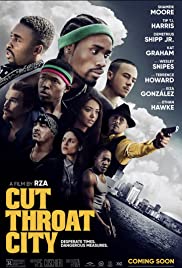
CUT THROAT CITY
US, 2020, 123 minutes, Colour.
Shameik Moore, Demetrius Shipp Jr, Denzel Whitaker, Keean Johnson, Kat Graham, T.I., Terrence Howard, Rob Morgan, Eliza Gonzalez, Ethan Hawke, Wesley Snipes, Isaiah Washington.
Directed by RZA.
The setting is New Orleans, in the aftermath of hurricane Katrina. There is devastation, and the effect is felt on four young men from a poor neighbourhood. They are persuaded by a gangster to participate in a daring robbery on a casino.
The film shows the robbery, its failure, the effect on the young men, their having to flee – and their being pursued by detectives as well as a warlord who thinks that they have taken his money. Strong drama, directed by the actor and composer, RZA, with the young cast but also a number of veterans including Terrence Howard, Rob Morgan, Ethan Hawke, Wesley Snipes, Isaiah Washington.
A strong variation on American gangster themes, with the atmosphere of Katrina and its destruction in New Orleans.
- The title? Crime and gangsters in American cities? James, his graphic novel, the title?
- The importance of the New Orleans setting, the black community, lifestyles, universities and education, lack of education, lack of job opportunity? Hurricane Katrina, the glimpses of the devastation, the voice-over narrative? Homelessness, the organisation for funding, interviews, rejections? Drug dealing, casinos, control, corrupt police, the role of politicians and aldermen?
- The atmosphere of the city, the neighbourhoods, homes, criminals, casinos, offices, police precincts? The cemetery? Musical score?
- The focus on Blink/James? With his brother? The visits to their mother? His education at the University, sketching, his graphic novel? The preparation for the wedding? The happiness of the wedding, his wife, son, bonding with him? Hanging out with his friends? The long friendship and bonds? His visit to the editor, the discussion, the influence from University days, rejection? He and his wife going for the interview, financial support, rejected? The impact and consequences?
- The sketch of the of the three friends, together, the drug dealer and watching him doing the deal is? Issues of black-and-white?
- The decision to rob the casino, going to Cousin Bass? The setup? His influence? The hold-up, the patrons, the masks, the money, shooting, Andre and his death? Going to The St for help with disposing of his body? Cousin Bass and his reaction, demanding more money, James, the torture, the rescue?
- The role of Cousin Bass, influence, personality? The contact with Courtney, undercover, corrupt, links?
- The men having to hide, going to James’s father, his living alone, not wanting them, not wanting the money in his house?
- The aldermen, his role, his house? Sympathetic towards the young men?
- Lucinda, getting the call, investigating the case, the visits, to the mother, the various interviews, her contacts? With the aldermen and his influence, support? Tracking down James, discussions with him?
- The role of The Saint, the church, the meetings, control, rivalries, the discussion with Bass, shooting him?
- The men themselves, in hiding, the further robberies, the store? The decision to attack the company with the funds for support after Katrina? The plan, the masks? Going in, the getaway car, the money, the security guard, shot? The confrontation, the police, the shootings – deaths?
- The men, deaths or not? The future? James, the discussions with Lucinda, reunited with his wife, the son, bringing them to meet his father?
- The aldermen, the aftermath, in the cemetery, his soliloquy about the dead? Courtney arriving, the money, the aldermen shooting him? Then setting up the young man to control the neighbourhood?
- The mix of fact and fiction, Katrina, the injustices, the treatment of the African-Americans, gangsters, police and authorities?